Although money does not solve all problems, it is indeed a basic need for survival in today’s society. The knowledge that money cannot buy directly was what the Chinese people needed most at that time. By converting to Christianity and receiving the education it provided, people not only learned to read but also received basic medical help. In the second chapter of the book “Visions of Redemption, Social Reform: The Role of Christianity”, Peter mentioned the social chaos and difficulties in progress caused by the four traditional Chinese diseases (poverty, disease, violence, and illiteracy).[4] The Chinese have realized that traditional Chinese culture cannot save this terminally ill country, and the social order has been chaotic and collapsed. At this time, we must learn from developed Western culture. Introducing more complete Christian teachings through the YMCA to promote social reform and promote literacy among all people will effectively eliminate these four diseases and rejuvenate Chinese society through “Saving the Nation through Character Development.”[3]
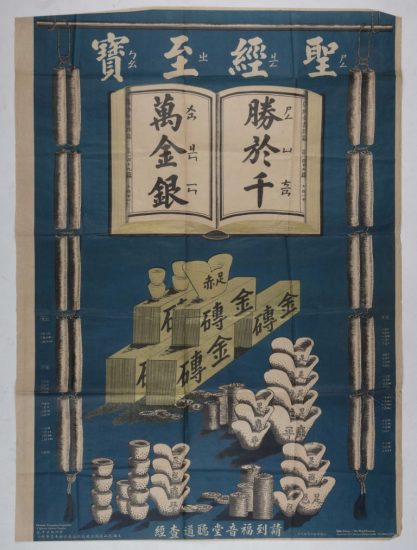
The sentence on the poster comes from Proverbs, Chapter 3, verses 13-15 of the Bible. The original text is: “Blessed are those who find wisdom, those who gain understanding, for she is more profitable than silver and yields better returns than gold. She is more precious than rubies; nothing you desire can compare with her.”[2]
The “wisdom” mentioned here is described as something more precious than material wealth, which is intended to emphasize that the value of wisdom and moral character far exceeds money and material wealth. From the perspective of the Chinese society described by Peter, it means the ability to read and write.[3] For the more traditional Chinese, nothing is more important than money. The Chinese at that time did not realize the importance of studying (not only do you have to pay to study, but you also have to spend time studying. With this time, you can already support your family by becoming a farmer or worker). But this poster likens the ability to read and write to “spiritual wealth,” which can encourage people to pursue wisdom. This kind of wealth can guide people to the right path in life and bring true satisfaction and peace, which is incomparable with money and material things.
Therefore, the metaphor “胜于千,万金银” is used to express the supreme value of wisdom and remind people that they should prioritize the pursuit of spiritual and moral growth in life, not just material accumulation. This is a high-level guide to life values and goals, encouraging people to pursue deeper satisfaction and happiness.
Of course, another understanding is that through literacy and reading, you can also make money in the future. The Christian church provides the correct learning path to help civilians learn. This is an opportunity to become literate and make money.
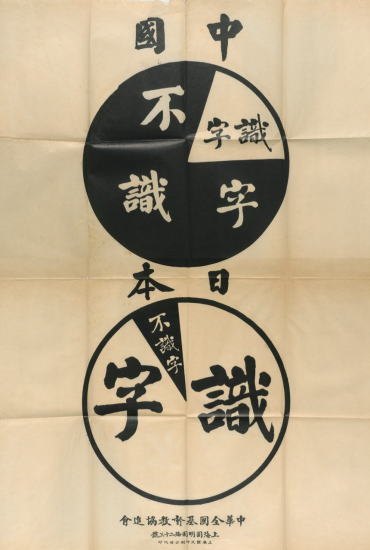
Just like the picture on the left describes. China’s literate population is far smaller than Japan’s. Because of the ignorance of the Chinese people, various kinds of loss of power, humiliation and invasion were caused from the end of the Qing Dynasty to 1949. Literacy is also mentioned in Peter’s ideas for social reform as a key driver of money making and social development, as it opens the door to knowledge and information and promotes innovation and economic activity. For example, Peter mentioned Li Dazhao, one of the founders of Chinese Marxism.[4] At the same time, he was also the spiritual mentor who truly inspired Mao Zedong. He said in the article 读书求真知 务实求真理published in the Study Times: “Knowledge is the candle that guides the light and true realm of life, and ignorance is the obstacle to reaching the light and true realm, which is life.”[1] When more people master reading and writing skills, the overall economic productivity and efficiency of society can be improved, thus accelerating the development process of society.
At the same time, it is crucial to promote “civic training for everyone” because this training not only covers basic literacy education, but also includes the knowledge to understand and perform civic responsibilities, such as legal awareness and social participation, which are essential for maintaining society. It is vital to maintain order, promote fairness and justice, and ensure the healthy functioning of democratic institutions. When everyone has basic “quality”, the four diseases will become farther and farther away from people.
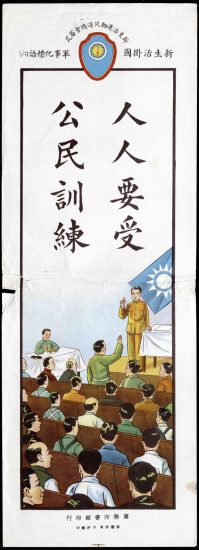
In China at the end of the Qing Dynasty, poverty, disease, violence, and illiteracy led to widespread social problems. These posters bring a very good solution to the audience: converting to Christianity can receive help and solve these problems. In Liang Jialin’s lecture, he mentioned that Christian churches help reduce illiteracy rates and improve people’s life skills and economic independence by providing education. They also established Western-style hospitals and clinics to combat disease and improve public health. By spreading the teachings of love and peace, Christian organizations not only gain followers but also help reduce social violence (education reducing illiteracy also helps reduce violence). In addition, they help alleviate poverty and enhance social welfare through education and charity work.[3]
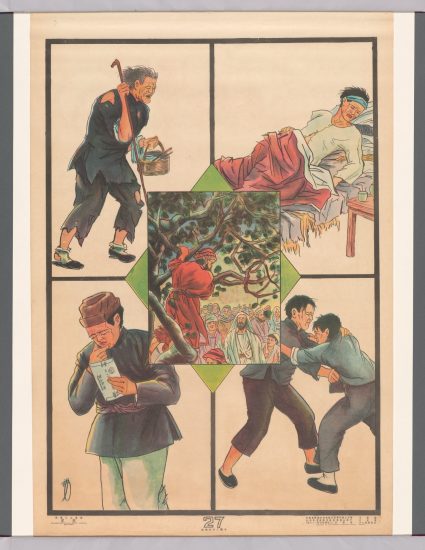
It was still Liang’s lecture. He mentioned the reasons why the Young Men’s Christian Association (YMCA) borrowed ideas from the Christian Church: First, Christianity was popular as a “foreign religion.” At that time, the Chinese believed that Christianity and Western culture had the same root. When their own culture was weak, it was very necessary to learn from developed Western culture. At the same time, the Christian Church, like the Chinese people at that time, had the same expectations for Western culture. They were eager to guide China to a way out and plan to save the country by introducing foreign doctrines and culture.[3]
Just like the poster below, “Saving the Nation through Character Development” comes from the Christian spirit of fraternity, justice, and peace. Because the Chinese people already believe that the moral spirit of traditional China has deteriorated and are eager to make comprehensive reforms. The spirit of Christ is just right for the psychological construction of Chinese people. It can promote social reform and meet China’s needs.
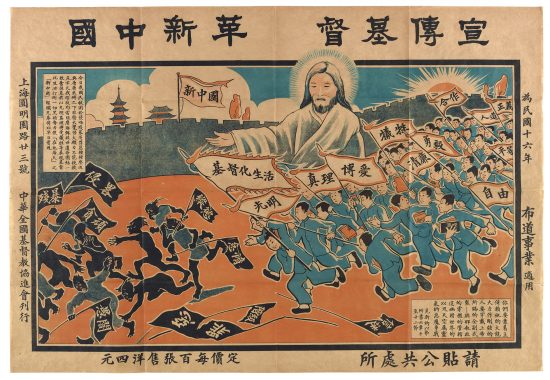
Work Cited:
[1] Feng, Bin, and Zihao Fan. “李大钊:读书求真知务实求真理 – 党史.” 中国共产党新闻网, 2019. http://dangshi.people.com.cn/n1/2019/0911/c85037-31347726.html.
[2] Proverbs, 3: 13-15, The holy bible: Containing the old and new testaments ; translated out of the original tongues and with the former translations diligently compared and revised. New York: American Bible Society, 1986.
[3] Liang, Jialin. “梁家麟 《中国教会史十讲》七、全面西化下的基督教.” 中国教会史(180): 梁家麟 《中国教会史十讲》七、全面西化下的基督教. Accessed March 26, 2024. https://study.christianleaders.org/mod/page/view.php?id=56322&forceview=1.
[4] Zarrow, Peter. “ Social Reform: The Role of Christianity.” In “Visions of Salvation”. ed. Daryl R. Ireland , 33–51. Waco, Texas: Baylor University Press, 2022.
